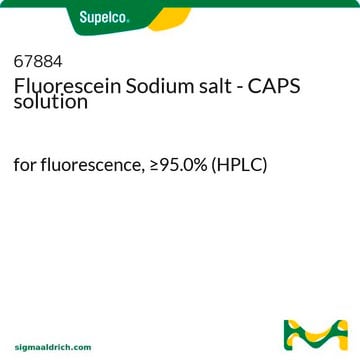About This Item
Recommended Products
Product Name
Fluorescein (free acid), Dye content 95 %
form
powder
Quality Level
composition
Dye content, 95%
technique(s)
titration: suitable
color
orange to red-brown
mp
320 °C (lit.)
λmax
496 nm
ε (extinction coefficient)
≥12000 at 282-286 nm
≥39000 at 236-240 nm
≥70000 at 488-492 nm
application(s)
diagnostic assay manufacturing
hematology
histology
storage temp.
room temp
SMILES string
Oc1ccc2c(Oc3cc(O)ccc3C24OC(=O)c5ccccc45)c1
InChI
1S/C20H12O5/c21-11-5-7-15-17(9-11)24-18-10-12(22)6-8-16(18)20(15)14-4-2-1-3-13(14)19(23)25-20/h1-10,21-22H
InChI key
GNBHRKFJIUUOQI-UHFFFAOYSA-N
Looking for similar products? Visit Product Comparison Guide
General description
Application
Signal Word
Warning
Hazard Statements
Precautionary Statements
Hazard Classifications
Eye Irrit. 2
Storage Class Code
11 - Combustible Solids
WGK
WGK 3
Flash Point(F)
Not applicable
Flash Point(C)
Not applicable
Personal Protective Equipment
Choose from one of the most recent versions:
Certificates of Analysis (COA)
Don't see the Right Version?
If you require a particular version, you can look up a specific certificate by the Lot or Batch number.
Already Own This Product?
Find documentation for the products that you have recently purchased in the Document Library.
Customers Also Viewed
Our team of scientists has experience in all areas of research including Life Science, Material Science, Chemical Synthesis, Chromatography, Analytical and many others.
Contact Technical Service










